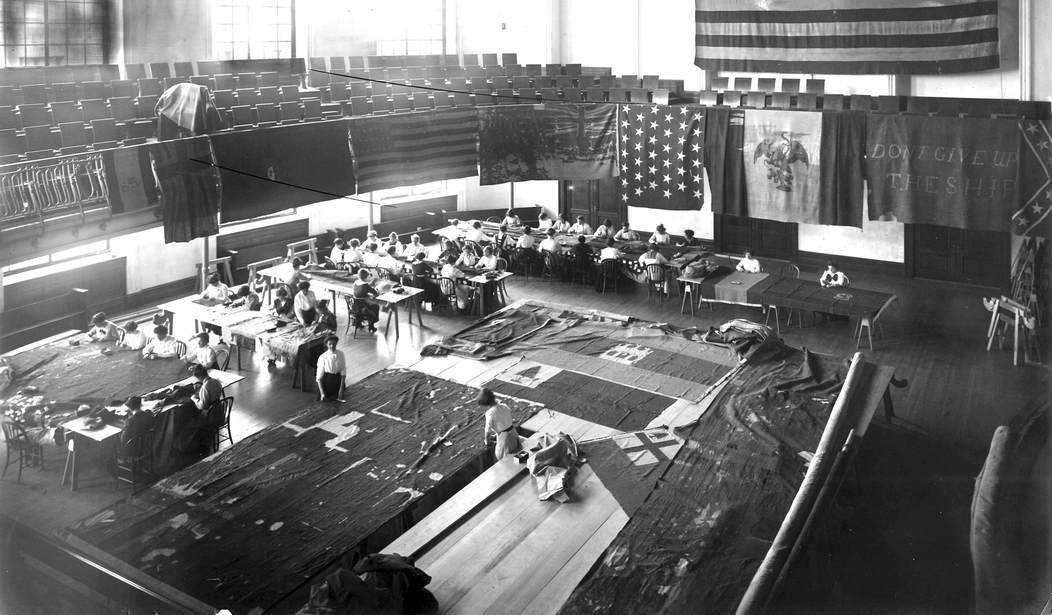The US Naval Academy is attempting to separate Midshipman 1/C Chase Standage from the Navy for Twitter tweets made in June that USNA leadership has determined to be “conduct unbecoming a midshipman,” as previously described in this article. “Conduct unbecoming” is a violation of Article 133, Uniform Code of Military Justice, but USNA leadership chose to administratively adjudicate MIDN Standage’s case instead of pursuing a trial by court martial. That is a polite way of saying “sham,” as this article will illuminate. Here is the chronology of the case:
~15 June: Initial complaint registered. Two midshipmen filed the original complaint although the senior enlisted advisor to the football team concurrently contacted MIDN Standage and told him he was unfit to return from leave to USNA.
26 June: JAGMAN investigation completed. A junior Navy line officer conducted a preliminary investigation in accordance with the Manual of the Judge Advocate General of the Navy (JAGMAN) to determine whether MIDN Standage had violated the UCMJ or naval regulations.
6 August – 23 September: USNA adjudication under the Administration Performance and Conduct System (APCS). The two conduct charges of which he was accused were: (1) Violation of an internal instruction on political activities of midshipmen, and (2) Conduct unbecoming a midshipman (an Article 133 offense). The process included adjudication before the Deputy Commandant (CAPT Robert Mathewson, USN), an appeal to the Superintendent (VADM Sean Buck, USN), adjudication and appeal denial by the Chief of Staff (CAPT James Bates, USN), adjudication before CAPT Bates, and a final review of the adjudication by the Superintendent. The result was a recommendation to separate MIDN Standage from the Navy and require him to reimburse USNA for the costs-to-date of his education. [Note: the Commandant (CAPT Thomas Buchanan, USN) had recused himself due to inflammatory and prejudicial social justice tweets by his 14-year-old daughter.]
24 September: Orders to MIDN Standage. MIDN Standage was removed from classes and directed to out-process and leave USNA by 30 September.
30 September: Lawsuit motion for preliminary injunction filed by MIDN Standage in a Maryland district court. The basis for the lawsuit and the requested relief was violation of due process and First Amendment rights, including viewpoint discrimination. An emergency hearing was conducted on 30 September, and a temporary injunction was granted on 1 October, allowing MIDN Standage to remain at USNA pending disposition of the motion for preliminary injunction.
14 October: Opposition to motion for Preliminary Injunction and motion to dismiss filed by the defendants. The rationale behind the motion to dismiss is that the Court lacks jurisdiction to hear the case. One argument the Defendants make rests on the concept of “sovereign immunity.” Sovereign immunity is a legal principle by which a government entity is immune to a civil suit. Further, the motion to dismiss contains the following argument: “The decision that the conduct of a midshipman is unsatisfactory belongs to the Superintendent, and the decision to discharge belongs to the Secretary.”
20 October: Reply and opposition to motion to dismiss filed by MIDN Standage. The reply focused primarily on the following arguments: (1) legal precedents that undermine USNA’s claim to sovereign immunity, (2) the absence of any known or established standards of conduct prior to the alleged offenses, (3) legal precedents that show USNA committed viewpoint discrimination and violated MIDN Standage’s First Amendment rights, and (4) legal precedents that show MIDN Standage’s Fifth Amendment due process rights were violated by the APCS adjudication. The issue in question is not the Superintendent’s conduct authority (which is unchallenged), but rather that he has no authority to violate a midshipman’s constitutional or legal rights.
Motion for preliminary injunction and motion to dismiss scheduled to be heard by the district court.
MIDN Standage was accused of two conduct charges under the APCS that resulted in USNA’s recommendation to the Assistant Secretary of the Navy for Manpower and Reserve Affairs [ASN(M&RA)] to separate him from the Navy. When the case was first heard by the Deputy Commandant, MIDN Standage promptly appealed, but the USNA chief of staff summarily dismissed his appeal in the following statement:
The issue with your social media comments was in the manner in which you expressed your opinions, not necessarily with the opinions themselves. You are not being punished for your beliefs, but for the fact that you failed to express them in a way that is consistent with our Navy core values.
The Chief of Staff unilaterally determined that MIDN Standage’s First Amendment rights had not been violated – and arbitrary decision characteristic of a sham. MIDN Standage’s tweets were constitutionally protected speech and were made from a Twitter account in which he did not identify himself as a member of the US military, let alone a midshipman at USNA. What were the particular prior standards of conduct regarding social media communications that were violated? No such standards were articulated throughout the entire APCS adjudication process. And the fact that USNA leadership chose to pursue administration adjudication instead of an Article 133 court martial for “conduct unbecoming” is in itself a suspicious acknowledgement that the only case for separating MIDN Standage from the Navy could be made by an entirely arbitrary and capricious administrative process in which the accused was not represented by legal counsel at the adjudications. How is it that it was the “manner” but not the “content” that led to the decision to separate MIDN Standage from USNA? The due process and First Amendment rights of the accused are to be dismissed by a claim of sovereign immunity? This is precisely why the District Court vice the APCS sham is the right place for this determination to be made. Think of the absurdity. Midshipman Standage in his filing accuses the academy leadership of violating his First Amendment rights, and they think they should be the ones to adjudicate that charge without any explanation or description of how they arrived at that determination.
In reading through the court documents filed to date, other troubling aspects of the government’s case are illuminated. Under the APCS, the Superintendent (and the Commandant and Deputy Commandant) are the final arbiters who are apparently not to be questioned about their decision-making. There was no record of the adjudication proceedings, no legal authority cited in MIDN Standage’s case disposition, and no presentation of evidence sufficient to prove the charges against MIDN Standage. Apparently only arbitrary and culturally- and politically-acceptable Command-endorsed views on social media speech satisfy the unwritten standard of acceptable conduct by a midshipman.
Then there is this excerpt from the Reply in support of the motion for preliminary injunction:
As to MIDN Standage’s tweets concerning Breonna Taylor, for example, the Deputy Commandant declared that the officers who shot Breonna Taylor were guilty (which proved to be wrong). When MIDN Standage was asked why he would think otherwise, MIDN Standage said he had viewed the situation through the eyes of his parents. The Deputy Commandant then said, “Why would your parents shoot an innocent person?” Evidently one must share the Deputy Commandant’s and the Command’s views on an extremely fraught issue of social and criminal justice to be fit to serve; any contrary views ipso facto are dishonorable and warrant discharge.
As a reminder, both of MIDN Standage’s parents are officers serving with the Los Angeles Police Dept. How are MIDN Standage’s tweets defending the police (protected speech!) evidence of “conduct unbecoming a midshipman”?
And this:
As to MIDN Standage’s tweets concerning domestic terrorists, the Deputy Commandant challenged the assertion that any of the protestors were domestic terrorists or that anyone had declared them as such (which also proved to be wrong, as reflected by, among other things, Tweets by the President pre-dating MIDN Standage’s tweets).
That sure looks like the Deputy Commandant was focusing on the CONTENT of the tweets, not the “manner” in which MIDN Standage expressed his personal opinions.
What about due process rights? Here is another excerpt from the Reply in support of the motion for preliminary injunction:
The action the Deputy Commandant “deemed appropriate” was to direct the Commandant’s Conduct Officer to put MIDN Standage into the Administrative Conduct System. That act made the Deputy Commandant himself MIDN Standage’s de facto accuser. In violation of the very due process precept identified by the court in Hagopian [a legal case precedent], the Deputy Commandant then proceeded to shift from his prosecutorial function to his judicial function. At the adjudication, the Deputy Commandant accused MIDN Standage of being a racist, accused him of being a liar, scoffed at the notion that the Commander-in-Chief set the standard of conduct for social media activity, and asked why MIDN Standage’s parents would shoot an innocent person. These are not the acts of an adjudicator in search of the truth; they are the acts of a prosecutor who had already made up his mind as to MIDN Standage’s guilt and used the adjudication to prove it. He then found MIDN Standage guilty of both charges, imposed the maximum punishments allowable, and forwarded him for separation. The Deputy Commandant’s overwhelmingly clear conflict of interest, and his bias, denied MIDN Standage a fair and impartial hearing and deprived him of his right to due process under the Fifth Amendment.
The Reply also contains disturbing recitations about how USNA leadership views retention of counsel by an accused midshipman.
[T]he Superintendent criticized MIDN Standage’s decision to retain counsel, tried to invade the attorney/client privilege by asking MIDN Standage what his counsel had “told him to say,” suggesting that MIDN Standage was being disingenuous on advice of counsel, and stated that, in his “professional judgment,” MIDN Standage’s decision to take an appeal from the Deputy Commandant’s findings and punishments was the “wrong move.” These kinds of comments typify the Naval Academy’s view of midshipmen who retain counsel and try to defend themselves. Many midshipmen undersigned counsel has represented have been told by their chains of command that the reason the officers were recommending separation versus retention was because the midshipmen had retained counsel and were not “owning it.”
There is ample legal precedent in court rulings that admonish the imputation of guilt to those who retain counsel.
Finally, there was this argument from the government’s motion to dismiss on the basis of public interest:
This case—if heard at this premature time—will open the door to untimely complaints by future midshipmen and military personnel who seek to circumvent the “hierarchy of command” that is critical to the United States’ ability to maintain a ready and lethal fighting force.
“The United States’ ability to maintain a ready and lethal fighting force.” The reality is absolutely the opposite, as this excerpt from the Reply to the government’s motion to dismiss clearly elucidates:
In his Executive Order of September 22, 2020, the President clearly and compellingly articulated the public interest at stake here:
[O]ur Uniformed Services should not teach our heroic men and women in uniform the lie that the country for which they are willing to die is fundamentally racist. Such teachings could directly threaten the cohesion and effectiveness of our Uniformed Services.
Defendants’ assertion that the issuance of a preliminary injunction could interfere with processes “critical to the United States’ ability to maintain a ready and lethal fighting force” … is completely undermined by the directives of the President. The Executive Order could not make more clear that the Superintendent’s indoctrination of the Brigade of Midshipman in critical race theory, the on-going viewpoint discrimination that flows from it, and an Administrative Conduct System rigged to ensure such discrimination, are existential threats to the Country’s ability to maintain a ready and lethal fighting force.
The public interest at stake here is not about chilling command decisions. It is about enjoining command violations of Presidential directives and the discriminatory practices that flow from them. It is clearly in the public interest that the Defendants obey the lawful orders of the Commander-in-Chief and cease and desist from engaging in discriminatory practices that continue to deprive midshipmen, including MIDN Standage, of their First Amendment rights. It is also clearly in the public interest that the Naval Academy’s implementation of its Administrative Conduct System should be exposed for what it is, a procedural sham that routinely violates the Fifth Amendment rights of midshipmen, violates its own governing regulations, and ignores substantive law.
That is precisely right. It is USNA leadership that has willfully ignored the President’s cease-and-desist order on critical race theory training (CRT) in the federal government and in fact has arbitrarily exploited the racial division that CRT creates to separate MIDN Standage from the Navy via the APCS adjudication sham.
A better understanding of the sham that is the APCS and how adjudications are performed is required in order to fully understand the real travesty of the Standage proceedings. COMMANDANT OF MIDSHIPMEN INSTRUCTION 1610.21, Administrative Performance and Conduct System, describes the requirements and procedures of the APCS. The rights of accused midshipmen are laid out in Section 3.3g:
- Right to Counsel (but not during hearings unless pre-approved by the Commandant)
- Right to Testify or Remain Silent
- Right to Inspect Evidence
- Right to Object
- Right to call reasonably available witnesses and be notified of witnesses scheduled to be called by the Adjudicating Authority
- Right to present evidence in defense, mitigation, and extenuation
- Right to present an oral and/or written argument in support of his or her defense
Three red flags exist: (1) counsel cannot be present during the adjudication hearings, which means the accused midshipman is on his own in defending himself against all charges; (2) no records are kept of the adjudication hearings; and (3) whenever a midshipman exercises the right to counsel, the exercise of that right is held against him by the chain of command. The latter was clearly in evidence in the Standage case, as described above. The Superintendent himself imputed guilt when MIDN Standage sought legal counsel and filed his appeal. MIDN Standage literally became a “dead man walking” from that moment on.
While midshipmen – like other members of the US Navy – are entitled to legal representation, the APCS process precludes their presence during hearings. The JAG corps officers stationed at USNA are largely assigned to advise and protect the Command. Only one JAG officer is nominally available to support more than 4000 midshipmen. The Commandant and Deputy Commandant have two JAGs, and the Superintendent has three. There is no process in place to automatically assign a JAG attorney to an accused midshipman.
Although APCS is described as an “administrative” vice a “military justice” system, it nonetheless purports to provide midshipmen robust procedural due process protections, a sufficiency-of-the-evidence standard, and adherence to substantive legal standards. That’s the theory; but in practice, they are a Potemkin Village, as due process, federal standards, and the law are not followed in the adjudication hearings, as described above. The entering presumption is that an accused midshipman is guilty of the charges rendered, and the process is designed to obtain a confession. Here are its fundamental characteristics: retention of counsel an “indication of guilt,” one midshipman versus senior officers during hearings, misapplication of the rules of evidence, arbitrary application of unwritten standards by the adjudicators throughout the process, lack of due process, no record of the proceedings, and essentially a waiving of the rights of the accused midshipman.
This is the very definition of a sham legal process – and this is exactly what MIDN Standage was forced to endure. MIDN Standage, with the Sword of Damocles figuratively hanging over his head, was required to organize and conduct his own defense while USNA leadership was supported by a full staff including multiple JAG officers. And now the government has an Assistant United States Attorney representing them at the district court!
Clearly, the Standage case must be used as a springboard to demand an Inspector General review of the APCS, especially for the most serious cases in which a separation offense is involved. If the offense is serious enough that a midshipman can be expelled, the deck must be unstacked against the accused midshipman, and the entire process must be fair and impartial, with proper representation, rules of evidence, and due process throughout. That simply is not the case today.
The next milestone in this case is the court’s hearing on MIDN Standage’s motion for preliminary injunction on Friday. Stay tuned!
The end.
[Big H/T to Al]
P.S. As MIDN Standage’s parents are LAPD officers and not wealthy, they have established a a crowd funding source at Give Send Go. GSG is a Christian-based crowdfunding organization that does not discriminate, unlike Go Fund Me. You may wish to consider a donation at the website, which contains additional information about the case: https://givesendgo.com/GWFU














Join the conversation as a VIP Member